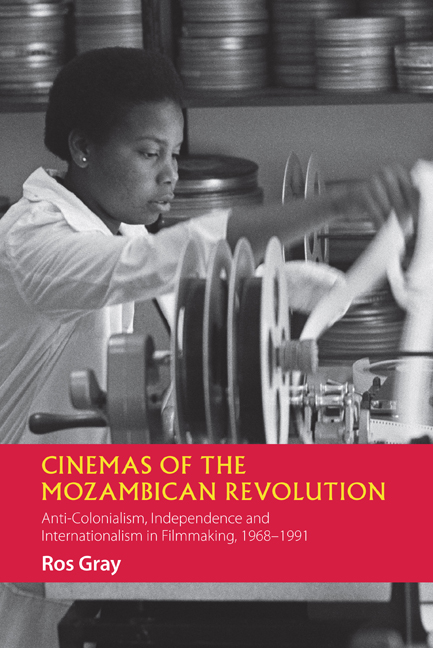 Cinemas of the Mozambican Revolution
Cinemas of the Mozambican Revolution Published online by Cambridge University Press: 16 July 2020
Within a year of the 1973 revelations of the Wiriyamu massacre (see Chapter 1), the Carnation Revolution in Portugal toppled the New State and Frelimo was catapulted into the position of being able to demand independence for Mozambique. As Rui Assubuji and Patricia Hayes recount, in November 1974, shortly after the signing of the Lusaka Accord that brokered independence, Samora Machel was flown from the Zambian capital to Nachingwea, the Frelimo military base in Southern Tanzania close to the border with Mozambique. With him were Frelimo officials and journalists from Lourenço Marques who had taken the inaugural flight from the Mozambican capital to Dar es Salaam on a new route that opened following the Carnation Revolution; from Dar they travelled to join Machel in Zambia. Journalist Migueis Junior published a series of accounts of this trip in the newspaper Notícias, recalling that he and his colleagues looked down from the plane, searching ‘down on the ground for the key that would perhaps open for us the secret, the magic of Frelimo’s most famous political-military centre.’ This vertical perspective onto the territory was one that had, during the armed struggle, only been available to those operating on the side of the Portuguese army. Now that Frelimo was poised to take over the government of Mozambique, it was they who could command this view from the skies, and this too signals a shift in orientation of the films made with Frelimo away from addressing only international audiences to capturing the hearts and minds of the people of Mozambique.
Back in Tanzania for the occasion was Yugoslav camera operator Dragutin Popović, who had made Venceremos with the liberation movement (see
To save this book to your Kindle, first ensure [email protected] is added to your Approved Personal Document E-mail List under your Personal Document Settings on the Manage Your Content and Devices page of your Amazon account. Then enter the ‘name’ part of your Kindle email address below. Find out more about saving to your Kindle.
Note you can select to save to either the @free.kindle.com or @kindle.com variations. ‘@free.kindle.com’ emails are free but can only be saved to your device when it is connected to wi-fi. ‘@kindle.com’ emails can be delivered even when you are not connected to wi-fi, but note that service fees apply.
Find out more about the Kindle Personal Document Service.
To save content items to your account, please confirm that you agree to abide by our usage policies. If this is the first time you use this feature, you will be asked to authorise Cambridge Core to connect with your account. Find out more about saving content to Dropbox.
To save content items to your account, please confirm that you agree to abide by our usage policies. If this is the first time you use this feature, you will be asked to authorise Cambridge Core to connect with your account. Find out more about saving content to Google Drive.